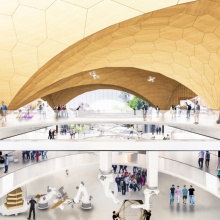In the final round of the competition for the title “University of Excellence“ as part of the Excellence Strategy to strengthen top-level research in Germany, the University of Stuttgart was unable to prevail in the final review. Nevertheless, the university will pursue its vision of “Intelligent Systems for a Sustainable Society” and implement many of the application's objectives and measures to a reduced extent from its own resources.
The Rector of the University of Stuttgart, Prof. Wolfram Ressel, comments on the result both disappointedly and full of confidence: “It was clear to us that the competition would be very tough and that we were not necessarily among the favorites, which were universities already being funded as Universities of Excellence. We wanted to take the opportunity anyway and invested a lot of energy, personal commitment and team spirit in the preparations. This is also why we come out of the competition stronger. We will stick to our vision and do everything we can to be at the forefront next time. I would like to thank all those involved for their great dedication and passionate commitment.“
For the first time, the University of Stuttgart was entitled to apply for the final round of the Bund-Länder competition for the title “University of Excellence“. Two Clusters of Excellence, for which the University of Stuttgart successfully attracted funding last year, were the prerequisite for the competition: The Cluster of Excellence “Data-Integrated Simulation Science” (SimTech) and the Cluster of Excellence “Integrative Computational Design and Construction for Architecture” (IntCDC). With initially 195 proposals and 57 approved projects in the Cluster of Excellence funding line, only 19 universities and university networks made it to the final stage of the competition for funding as a University of Excellence. As a result, the entitlement alone has promoted the University of Stuttgart to the circle of the best universities in Germany.
Content of the application and planned measures
The University of Stuttgart entered the competition with a courageous and concrete theme, which is also the university's vision: “Intelligent Systems for a Sustainable Society”. With this vision, the University of Stuttgart has set itself two goals: For one thing, it wants to become a leader in the field of Intelligent Systems and, secondly, be a pioneer for a university that sees itself as an Intelligent System and acts accordingly. The concept is based on the particular strengths of the University of Stuttgart: its wide range of courses offered, its highly developed interdisciplinary teamwork, the quality of research and the great potential for cooperation, which is already present in numerous large-scale projects with partners from science and industry in Europe's leading high-tech region of Stuttgart and worldwide.
Thematic priorities include the research-intensive high-profile areas of Architecture and Adaptive Building, Digital Humanities, Production Technologies, Quantum Science and Simulation Science. Based on this, a total of ten comprehensive packages of measures were presented to the panel of experts, covering all strategically important areas of the university. Among other things, this includes the gradual expansion of the high-profile areas “Autonomous Systems” and “Biomedical Systems”. Also, the reflection on Intelligent Systems (not only from a scientific, but also from an ethical point of view) plays a major role. At the organizational level, the university wants to develop further, so that it will be able to agilely adapt – dynamically, efficiently and transparently – to changing circumstances and new challenges. Some projects have already been launched, such as the Terra Incognita funding program for pioneering research in uncharted areas of the future, and the School for Talents with new offers and funding opportunities for gifted students.
Over the next few weeks, the University of Stuttgart will closely analyze the feedback from the expert commission in order to carry out further development measures and to position itself for the next round of applications. “We will make use of the momentum and, with the funding the university already received in the context of the Clusters of Excellence, implement some forward-looking projects that we also presented in the course of our application for the University of Excellence,” says Ressel.


